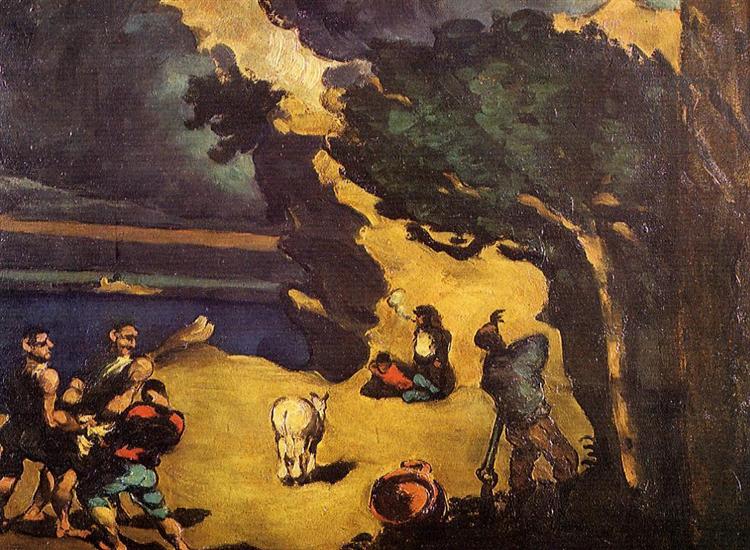Description
Paul Cézanne's "The Thieves and the Donkey", painted in 1870, establishes a remarkable connection between visual narrative and the formal exploration that characterizes the artist's work. Reflecting not only an action scene but also a deep introspection in the use of color and structure, the painting clearly shows the path that Cézanne would begin to follow in his career towards modernity.
In the foreground, two figures are seen with their backs turned, who appear to be thieves, forming the core of the narrative. Their sturdy, robust bodies point to an implicit tension in the scene, almost as if they were in a moment of conspiracy. The posture of these characters suggests both urgency and cunning, characteristics of characters in a confrontation with the law or with other “hunters.” Impressively, the way Cézanne captures the immediacy of the action is enhanced by the handling of color, where shadows and lights intertwine in a constant dialogue.
The donkey, which is placed at the centre of the composition, seems to be both a witness and a pioneer of the situation. Its presence adds an element of incongruous tenderness to the background of tension. The depiction of the animal, treated in an earthy palette, contrasts with the vibrant and more stylised depiction of the human figures. This distinctive approach to the depiction of the donkey is emblematic of Cézanne's interest in natural elements, a recurring theme in his works.
The composition, meanwhile, must be observed carefully. Cézanne uses a wooded background that rises behind the figures, creating a sense of depth and context. The vegetation is expressed through brush strokes that suggest rather than describe, an approach that becomes one of the emblematic characteristics of late Impressionism. Here, the dark tones of the landscape contrast with the light reflecting off the donkey, providing an atmosphere of intrigue.
The use of color and form in this piece also adheres to Cézanne's search for truth in nature. Through his approach to painting as a means of exploring the relationship between color and perception, he shows his commitment to challenging the artistic conventions of his time. Cézanne would later turn to exploring volume and geometry in his compositions, but in "The Thieves and the Donkey," we can still see glimpses of the transition between Impressionism and the path to modernism.
Although this work may be less well-known than Cézanne's other works, its meticulous detailing and visual narrative invite a deeper analysis of the interrelationship between the characters and their surroundings. The work stands as a representation of a fleeting moment, charged with meaning, and reflects Cézanne's mastery in his search for artistic truth that would distinguish him as one of the pillars of modern art.
KUADROS ©, a famous painting on your wall.
Hand-made oil painting reproductions, with the quality of professional artists and the distinctive seal of KUADROS ©.
Painting reproduction service with satisfaction guarantee. If you are not completely satisfied with the replica of your painting, we will refund 100% of your money.

